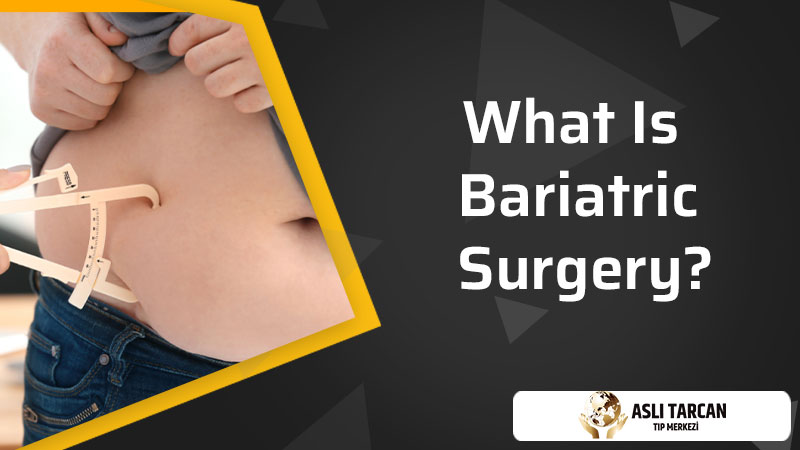What is Bariatric surgery and its types, the most common treatment against obesity and the diseases it causes? In bariatric surgery, surgeons prefer 4 common and safe methods. The main purpose of Bariatric surgeries is to prevent the patient from gaining weight. Among the 4 types of treatment in weight loss surgery, patients with BMI over 40 are suitable candidates. BMI is main evaluation method in Bariatric Surgery. It is body mass index showing obesity level of the patients. Most common 4 operations in Bariatric Surgery:
- Gastric sleeve operation,
- Gastric by-pass surgery,
- Adjustable gastric band,
- Biliopancreatic diversion.
Bariatric surgery is not curative on its own; it is just a basis action for weight loss treament. There are other treatments after weight loss surgery. A treatment plan is prepared according to what kind of secondary disease the patient has due to obesity. Except for the secondary disease, the patient has to change his dietary habits after weight loss surgery. The success of the surgery is indisputable in patients who do not change their eating habits. What is Bariatric surgery doing is slowing down eating capacity for a period of time.
What Happens in Bariatric Surgery?
It is important to learn What is Bariatric surgery and what happens to lead weight loss is important to all patients. Different techniques are used in weight loss surgeries according to their types. The main purpose of bariatric surgery types is to reduce the volume of the stomach. For this, Gastric sleeve surgery is one of the laparoscopic surgeries and allows the patient to reach the feeling of satiety. The person’s capacity to eat decreases after surgery in weight loss surgery of gastric sleeve. The patient with a smaller stomach eats less food and loses 60% of their excess weight within 2 years.
What is Bariatric surgery of Gastric Bypass is mainly deactivating stomach and intervening eating. Patients with Bariatric surgery feel full in short time and gain new eating habits. With Gastric Bypass, the patient loses 80% of their excess weight. It is a type of weight-loss surgery with a higher success rate and more common. In laparoscopic gastric band surgery patients will have a silicone lap band at their stomach and become unable to overeat. Biliopancreatic diversion is the least popular weight loss surgery used for some diseases. In this method there is a bypass that obstruct digestion of stomach.
In all of the basic types of surgery used for Bariatric Surgery, weight loss begins after surgery. But weight loss is associated with reduced eating capacity, and without nutritional therapy, the success rate drops. The main purpose of surgeons performing weight-loss surgery is to save the patient from the effects of obesity.
What is Bariatric Surgery Effect?
The answer to what is Bariatric Surgery effect question are weight loss first and getting rid of secondary diseases for the second. Without weight loss surgery, obesity patients ave many diseases. Sleep apnea, heart disease, and diabetes cause poor quality of life or death in obese patients. Therefore, although doctors do not approve, they recommend Bariatric Surgery operations because the lives of their patients will be endangered. The effects of weight-loss Surgery are separate for the short-term and long-term and are different from each other.
What Bariatric Surgery short-term effects of weight loss surgeries include loss of appetite and some side effects for 3 days. Patients who recover from the effects of surgery and treatment after 3 days usually recover within 2 weeks. In the first days, they experience side effects such as nausea and vomiting and cannot eat as much as they want. There is no excess weight loss immediately after Bariatric Surgery. Weight loss starts within 2 months with adaptation and diets after the surgery and the patient gets use to the new stomach volume completely. The effects of surgery also affect defecation habits. Some patients feel more side effects after surgery, but they usually return home within 1-3 days after being discharged.
The most important of the effects of weight-loss surgery are the long-term ones. Since, it is possible to lose a lot weight in 3 months to 2 years. 90% of the weight gained other than the ideal weight is lost by Bariatric surgery and post operation treatments. With weight-loss surgery, the effect of losing weight continues for more than 10 years. However, some patients persist in their old eating habits and expand their stomach again by overeating. The effect of obesity surgery decreases with overeating.
What Is After Bariatric Surgery Treatment?
Everyone who has weight loss needs know “what is Bariatric Surgery” but are not aware of after weight loss operation responsibilities. It doesn’t matter which type of bariatric surgery you prefer to lose weight. Because basically, the common feature of all of them is to reduce the volume of the stomach. However, after Weight-loss Surgery, patients are still at the same weight and their adventures begin to lose weight. After Gastric Sleeve surgeries, patients start to use regular medication frequently and eat healthy. They need to eat frequently, and it’s important to eat healthy foods, not junk food anymore.
For what is Bariatric surgery treatment involving is not eating habits. After weight loss surgery, patients have to use many drugs. They have to exercise regularly so that the weight they lose does not cause skin sagging. It is also normal for them to feel sluggish because they can no longer eat junk food that gives energy. In addition to these, they now need to take vitamins every day. Most importantly, they need to adopt a new lifestyle.
There are also psychological effects in this adaptation period after bariatric surgery. Especially patients who feel happy by eating carbohydrates can no longer take this food. For a period of time, they feel both powerless and unhappy. Obese people with food addiction want to see a table like before. Here, patients who are in a psychological war of their own will feel this way in the post weight-loss surgery period. Although there are occasional ups and downs, the final victories are much greater and it’s good to work for it.
What is Bariatric Surgery and What Types are There?
If you are seeking an answer to, “what is bariatric surgery?” it is a surgical procedure designed to help people with obesity lose weight. The surgery works by reducing the stomach size and limiting the amount of food consumed. The procedure can be open or laparoscopic, typically cutting away parts of the stomach and small intestine.

A further answer to, “what is bariatric surgery?” is that it is a serious undertaking and should only be considered after all other forms of weight loss have been exhausted. It is essential to recognize that bariatric surgery is not a quick fix nor a guarantee of success. Patients must make lifestyle changes, such as following a healthy diet and exercising regularly to maintain long-term weight loss.
The most common type of bariatric surgery is bypass surgery weight loss. During this procedure, a small pouch is created from the stomach and connected directly to the small intestine, bypassing much of the stomach and part of the small intestine. Another popular form of bariatric surgery is weight loss surgery sleeve gastrectomy. During this procedure, about 75% of the stomach is removed, leaving a sleeve-shaped stomach roughly the size of a banana.





